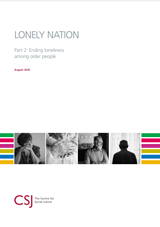Lonely Nation: Ending loneliness among older people

This report from the Centre for Social Justice (CSJ), in collaboration with Randal Charitable Foundation, shows that nearly 6 out of 10 of all adults feel lonely at least some of the time. The report suggests that older people are the least lonely age cohort in the UK. They claim older people are more likely to have a conversation with their neighbours, attend a community organised, volunteer and have a meaningful conversation with a friend or family member than the rest of the adult population.
However, the CSJ has also identified six challenges that cause of perpetuate loneliness amongst older people. Two of these are digital exclusion and housing. The others are public transport, family, intergenerational engagement and retirement.
With regard to housing, the CSJ makes several recommendations. These are:
- The Ministry of Housing, Communities and Local Government should ensure the ten HAPPI design principles are included within proposed reforms to the National Planning Policy Framework.
- The CSJ echoes the Centre for Ageing Better in calling for accessible and adaptable homes, known as M4(2) in building regulations, category two housing to become the new minimum standard for new-build homes.
- Within proposed reforms to the National Planning Policy Framework, the Ministry of Housing, Communities and Local Government should explicitly require all local plans to include a specific policy and target for new wheelchair accessible homes (known as M4(3) in building regulations), and where no local target is set, to require at least 10 per cent of new homes to meet the standard, subject to future population projections. Government should work with local authorities to determine the percentage of homes that will need to be accessible in certain areas to meet the needs of an ageing population.
- The Ministry of Housing, Communities and Local Government and Department of Health and Social Care should work together to produce new design guidance, in partnership with best practice stakeholders, for older people’s housing and social care settings which are focused on creating community and social connection.
With regard to digital exclusion, CSJ sets out the following recommendations:
- The Department for Science, Innovation and Technology should set out a new Digital Inclusion Strategy. A new strategy should recognise the importance of digital inclusion for protecting against loneliness and include measurable commitments for supporting older people to learn the necessary digital skills for engaging in society.
- The Department for Science, Innovation and Technology and the Department for Culture, Media and Sport should submit a joint bid to the Shared Outcomes Fund held by HM Treasury for a £10 million Digital Champions Fund to support new and ongoing work of small and medium sized charities who tackle digital exclusion amongst older people. Government should ringfence a percentage of funding for small and medium sized charities with an income under £2 million per year.
- HM Treasury should reduce VAT on social tariffs to five per cent. At 50 per cent take up this would cost the Treasury circa £58 million per year.
- The Department for Science, Innovation and Technology should mandate providers to improve their social tariff speeds to match average speeds.
And, other references to housing appear under the other challenges too. For example, under intergenerational engagement it says:
- The Department of Health and Social Care should promote intergenerational practice within its plans for a National Care Service by:
- Producing a framework of guidance for how specialist housing for the elderly such as care homes and sheltered accommodation can develop partnerships with childcare providers to build upon the successes of intergenerational nursery settings.
- Integrating social prescribing within care homes and retirement villages to link older adults to community groups and volunteering opportunities.
The CSJ report also cites the Housing LIN’s work to build the evidence base on the health dividend specialist housing, referencing our LGA funded report for Southampton City Council.
